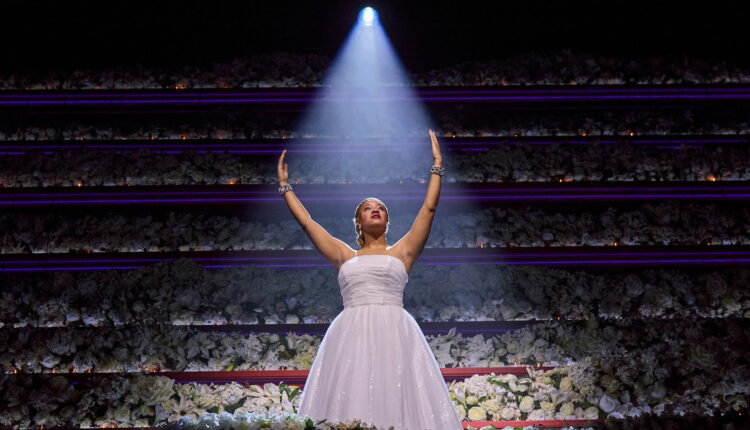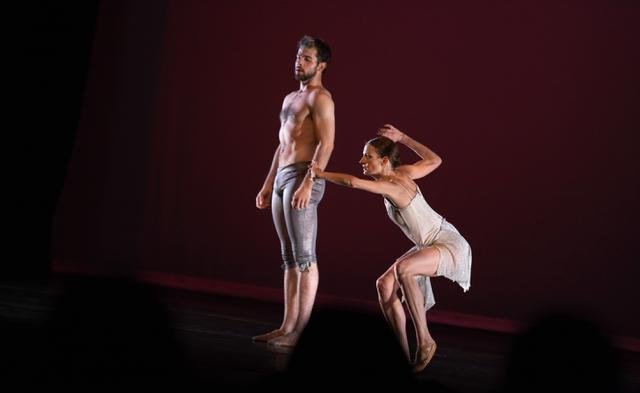By D. R. Lewis
This article was originally published in The DC Line, here.
Sammi Cannold’s Evita begins and ends with the same striking image: an angelic white gown floating over rolling fields of white flowers. The metaphor isn’t difficult to discern as the world continues to grapple with the legacies of Eva Perón’s meteoric rise to become first lady of Argentina in the 1940s and the subsequent Andrew Lloyd Webber/Tim Rice megahit that has kept her firmly in the international consciousness long after her death. But in this fresh production, running through Oct. 15 at Shakespeare Theatre Company’s Harman Hall and produced in association with American Repertory Theater, director Cannold forces a closer, neon-tinged look at the myth-making of Eva Perón and the alchemy required to become a populist icon.
After originating as a concept album in 1976, Rice and Lloyd Webber’s Evita premiered in London’s West End in 1978 ahead of a 1979 Broadway transfer. Telling the story of Eva’s early life, relationship with eventual Argentine President Juan Perón, reign as first lady and death at age 33, Evita was among the first “British Invasion” musicals and rock-style scores to hit Broadway. Now, having enjoyed countless revivals, productions and tours around the globe, plus a 1996 film starring Madonna, Evita could be easily treated as a period piece and a relic of a bygone era. Even its iconic anthem, “Don’t Cry for Me Argentina,” has been covered by the likes of Sinéad O’Connor, Donna Summer, Olivia Newton-John, and the cast of Glee.
But in the wake of a new American populism, Cannold invites her audience to take another look at Evita and interrogate the unpredictable events and mythologizing that allow an individual to capture (and hold on tightly to) a nation’s attention. Eva Perón may have been a singular sensation, but she also benefited from the good fortune of being in the right place at the right time with the right people and having the good sense to seize her moment. “Now, Eva Perón had every disadvantage you need if you’re gonna succeed” is a striking lyric that comes early in the musical, but sets the tone for the relentless social climbing and wily opportunism that catapulted her to the Casa Rosada. We watch as an impoverished young Eva (a strong Shereen Pimentel) attaches herself to a philandering lounge singer in order to get to Buenos Aires, leverages her beauty and agency to reap social advantages from well-positioned men, launches her career as an actress and radio star, and eventually introduces herself to Juan Perón (a sincere Caesar Samayoa), whose own star is rising. Eva carefully curates the narrative of her own ascent, never relinquishing her pull-yourself-up-by-the-bootstraps origin story and doubling down on her assertion that she is the “savior” of the Argentine poor. Her self-aggrandizing is foiled only by cynical narrator Che (an effective Omar Lopez-Cepero), who refreshingly fades in and out of the action to relate unsavory details of the Perón regime that Eva would rather not share.
Soon after securing her place as Juan Perón’s partner, Eva expels his mistress from the household in a scene where Cannold’s handiwork can be seen most clearly. Where past productions have lazily utilized “Another Suitcase in Another Hall” as an illustration of Eva’s viciousness, Cannold instead conjures a depth and magic that afford Eva a moment to quietly consider the fantastic series of events that accelerated her rise. Mimicking the staging of an earlier sequence where Eva interacts with a carousel of men to her increasing benefit, she now looks on as the cast-off young woman maneuvers through a similar sequence with the same men, but fails to acquire the same social advances as Eva. In this brief, breathtaking moment, the audience sees Eva recognize the fragile nature of her opportunity and make the firm decision to run full speed ahead to secure her spot at the top. Nevermind that the road ahead will be full of contradictions, greed, corruption and unrest.
Eva soon ignores the ideals she once held and the working class from which she rose in favor of desperate grasps at respect from the Buenos Aires elite she purports to abhor. Still, as she becomes more separated from the harsh realities of the country’s poor, potentially embezzles money under the guise of charitable giving and faces her own mortality within the walls of the presidential palace, she sings the old familiar tunes and becomes increasingly possessive of those who she could once reliably call “my people.” In her final moments, Pimentel’s Eva strains to maintain her grasp on life as much as her grasp on power, which have become one and the same. When the requiem that starts the show returns to complete it, one can’t help but wonder whether the public displays of mourning are entirely sincere, or simply the logical consequence of Eva’s myth-making.
The production’s designers borrow heavily from the gilded nature of Eva’s reign to great effect. As the show begins, single beams of lush white flowers covering the stage ascend to the rafters, revealing Jason Sherwood’s dark, utilitarian set whose five arches serve as portals for movement and windows into the Perón administration’s abuses. Emily Maltby and Valeria Solomonoff’s embellished choreography most often culminates in an unexpected political transaction or surprising power shift. Alejo Vietti’s gray but detailed costumes serve to blend the ensemble into monotonous groups — as Eva herself often refers to them, such as “the middle classes,” “a clutch of stuffed cuckoos,” or simply, again, “my people” — rather than to distinguish individuals. The uniformity is offset only by Eva’s white garments and flashes of deep red from Che’s undershirt. When combined with Bradley King’s excellent neon lighting, which frames the stage and scant structures of Eva’s world, you cannot escape the sense that you are watching a person write, stage and perform the story of her own life within a proscenium that she thinks she alone can see. Even so, in a first act that begs for a percussive electricity to match Eva’s hunger, a muted, electronic soundscape steals a bit of the bite.
Stories of politics and those who peddle power will always hold a special place in the hearts of Washington audiences and Evita, one of several co-productions slated for this season, is a strong start for Shakespeare Theatre Company. With Cannold’s fresh take, which serves more to reframe than reconceive the material, audiences have all the more reason to grapple with the persistent question of whether musicals like Evita (and Broadway’s current Imelda Marcos disco musical, Here Lies Love) work to glorify the legacies of complicated figures, or serve as cautionary tales of political ascension. Regardless of which side one may land, perhaps by interrogating the populists of the past, we can better understand those who wish to harness that same power today. Don’t worry, Eva. We won’t cry for them, either.





No Comments